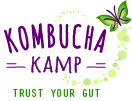
Sugar FAQ
Do I have to use sugar? I never consume sugar so it puts me off Kombucha. Why so much sugar?
I completely understand the aversion to sugar. However, the sugar in Kombucha is for the culture to consume, not for you.
When done fermenting, there will be about 2-6 grams per 8 ounce glass of unflavored Kombucha. By contrast, an 8 ounce glass of orange juice has about 24g of sugar. Even natural carrot juices have 13g per 8 ounces.
If fermented longer, say for 3 weeks or more, sugar levels in Kombucha may be even lower – Recommended for diabetics and others with low sugar tolerance.
Why does Kombucha need so much sugar?
Without sugar, Kombucha cannot ferment. Sucrose is most easy to digest by the yeasts; they consume the sugar and put out CO2 (carbon dioxide, i.e. the bubbles in your booch) & ethanol (alcohol). Which is nice.
BONUS FACTOID: Then, as part of the symbiosis, the bacteria consume the ethanol and express the healthy amino acids, trace vitamins and minerals.
Do I have to add all of the sugar?
Yes. The standard Kombucha recipe is 1 cup of sugar per gallon.
- Too little and you are inhibiting the brew’s normal healthy development; no SCOBY, no acetic acid.
- Too much and the yeasts will either a) “flush” and overrun the bacteria, or b) fall completely asleep and do nothing.
What type of sugar should I use to brew Kombucha?
This debate can be heated, but it’s really simple. Most sugars are fine for Kombucha (with a few exceptions, see below), but there are preferred choices:
- Plain White Sugar– the Kombucha culture consumes this easiest. Use only “cane sugar” to avoid GMO beet sugar. Concerns about trace toxins in white sugar processing should be considered.
- Evaporated Cane Juice – My personal choice. Cleaner process but slightly more difficult for the Kombucha to consume.
- Brown Sugar – Harder for the Kombucha to break down, it will also change the flavor significantly. Experimental batches only.
- Honey – A wonderful choice but DO NOT USE RAW. The bacteria will disturb the Kombucha SCOBY balance and could brew up a dangerous concoction.
- Agave – Can turn the brew more sour, so use less. Must be combined with another sugar type that contains glucose for the long term health of the culture.
BONUS FACTOID: Evaporated Cane Juice and brown sugar have higher levels of calcium, magnesium, potassium and iron. These healthful elements are passed on to the Kombucha drinker.
What types of sugar must be avoided when brewing Kombucha?
- Raw Honey – The naturally occurring bacteria will battle the SCOBY for dominance. It sounds bad because it is.
- Stevia – Stevia is a plant sugar and will not ferment.
- Xylitol (and it’s precursor Xylose) – What makes Xylitol great for chewing gum and teeth is that it’s “non-fermentable,” which makes it useless for the booch.
- Lactose – Kombucha is not lacto-fermentable.
- High Fructose Corn Syrup -Must I explain? Your body can’t even break this stuff down.
- Any Artificial Sweetener – I have heard some crazy ideas: Erithritol, Aspertame, Sucralose, Saccharin?! Someone asked if they can use Mountain Dew as starter. No. No you cannot.
BONUS FACTOID: High Fructose Corn Syrup caused a higher incidence of obeseity and metabolic diseases in rats than sugar (sucrose) in a study done by Princeton.
Can mutliple types of sugar be combined into one Kombucha brew?
Absolutely! Just as with tea blends, sugar blends can add flavor and depth to your brew. Have fun and experiment!
Organic? Fair Trade? Do these things matter?
Not to the Kombucha. Only to me. I make these (slightly more expensive) choices for my physical and mental health. However, no one should ever put off brewing Kombucha for fear of expense. Lipton tea bags and plain white sugar will get the job done just fine.
What if I forget to add the sugar? Can I add it after without harming the SCOBY?
Yes. If it has only been a few hours to a day, remove the SCOBY, add the sugar to the brew, stir and then return the SCOBY to your vessel. The sugar will be consumed by the yeast eventually, but the process may take a few extra days.
The science is confusing. What are fructose, sucrose & glucose?
- Sucrose (C12H22O11) = Regular Table Sugar = Fructose + Glucose
- Fructose (C6H12O6) = Natural Fruit Sugar
- Glucose (C6H12O6) = The most commonly used energy source in the biological world. Also known as dextrose.
Kombucha fermentation breaks down sucrose into fructose and glucose which feed the yeast which feeds the bacteria which feeds you. Awesome!
Is there a way to test for how much sugar is left in my brew?
You can try using a hydrometer to measure both sugar and alcohol content. However, it is a complicated process that produces inaccurate readings when dealing with Kombucha. In short, a hydrometer will overestimate both sugar and alcohol readings in the brew, often by double but sometimes more or less. For this reason, it’s difficult to trust.
If you want something a bit easier, you can use a Brix Refractometer.
For homebrewers, we generally do not recommend worrying about specific tests. Instead, we say Trust Your Gut and your tastebuds. The longer you ferment, the lower the sugar, but a little is needed to balance the flavor, so don’t let it go too long.
If it gets really sour, start a SCOBY Hotel with it!
